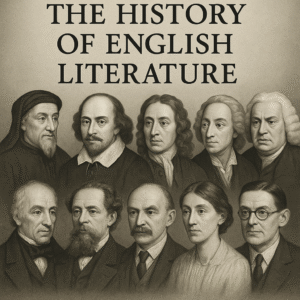Introduction to Martin Amis Martin Amis as novelist enjoys a unique place among the contemporary renowned writers. He remains a towering figure in modern British fiction. His novels explore ambition, decay, and the absurd edges of modern life. His prose Read More …
Category: The History of English Literature

The History of English Literature offers a rich exploration of the development of literary works from the earliest Anglo-Saxon texts to contemporary masterpieces. This category provides in-depth articles, study guides, quizzes, and timelines covering key literary periods such as the Old English era, Middle English literature, the Renaissance, Neoclassical Age, Romantic Movement, Victorian literature, and Modernist innovations. Whether you are a student, researcher, or literature enthusiast, you’ll find detailed analyses of major writers like Geoffrey Chaucer, William Shakespeare, John Milton, Jane Austen, Charles Dickens, and T.S. Eliot. Discover how historical events, cultural movements, and philosophical ideas shaped the evolution of English literature over the centuries. Enhance your understanding of literary techniques, themes, and genres as you navigate through the fascinating journey of English literary history. This resource is ideal for exam preparation, academic research, and anyone passionate about the legacy of English literary traditions.
Graham Swift as Novelist
1. Early Life and Education Graham Swift as Novelist holds a unique place in the contemporary English literature. He was born in London in 1949. He grew up in a post-war environment, which shaped his sensibilities as a writer. He Read More …
Kazuo Ishiguro as Novelist
1. Early Life and Cultural Background Kazuo Ishiguro as Novelist is a renowned figure of the contemporary English literature. He was born in Nagasaki, Japan, in 1954, and moved to Britain when he was five. His cultural background shaped his Read More …
Will Self as Novelist
1. Introduction to His Fiction Will Self as novelist reshaped British fiction through daring style and fearless subjects. He constantly challenges readers with unusual structures and grotesque exaggerations. Furthermore, his fiction refuses comfort, demanding deep attention and thoughtful reflection. His Read More …
Ali Smith as Novelist: Style, Themes, and Influence
1. Introduction to Ali Smith’s Literary Career Ali Smith as novelist is one of the most original voices in contemporary fiction. Her writing blends experimentation with accessibility, drawing in readers across different backgrounds. She challenges conventional storytelling by breaking structures Read More …
Jeanette Winterson as Novelist
1. Introduction to Jeanette Winterson’s Literary Vision Jeanette Winterson as Novelist is a distinctive figure in contemporary English literature. Her works blend myth, identity, and imagination with bold experimental techniques. Her novels represent a unique blend of imagination, philosophy, and Read More …
Ian McEwan as Novelist – Themes, Style, and Legacy
Ian McEwan as Novelist Early Life and Formative Influences Ian McEwan as Novelist stands among the most significant voices in contemporary British literature. His works reveal psychological depth, moral complexity, and an enduring exploration of human relationships. He was born Read More …
Julian Barnes as Novelist: Memory, and Postmodern Influence
Julian Barnes as Novelist 1. Early Life and Background Julian Barnes as novelist holds a specific place in the history of English literature. As a post postmodern writer, his influence is great and enviable. He was born in Leicester, England. Read More …
Carol Ann Duffy as Poet – Feminist and Postmodern Influence
Carol Ann Duffy as Poet Introduction to Carol Ann Duffy as Poet Carol Ann Duffy as Poet reshaped British poetry through voice, style, and fearless honesty. She explored themes of identity, memory, love, and politics with sharp observation. Readers embraced Read More …
Martin Crimp as Playwright — Innovation, Satire, and His Impact
Martin Crimp as Playwright Early Life and Influences Martin Crimp was born in Dartford in 1956. He studied English at Cambridge University, where he encountered experimental writing. Moreover, he developed interest in European drama, especially Ionesco and Beckett. Consequently, he Read More …
